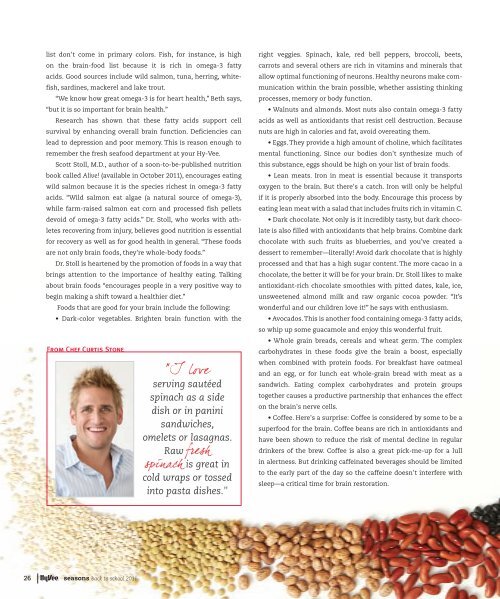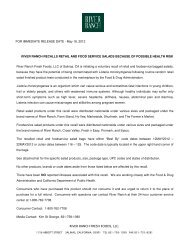Download PDF - Hy-Vee
Download PDF - Hy-Vee
Download PDF - Hy-Vee
You also want an ePaper? Increase the reach of your titles
YUMPU automatically turns print PDFs into web optimized ePapers that Google loves.
list don't come in primary colors. Fish, for instance, is high<br />
on the brain-food list because it is rich in omega-3 fatty<br />
acids. Good sources include wild salmon, tuna, herring, whitefish,<br />
sardines, mackerel and lake trout.<br />
“We know how great omega-3 is for heart health,” Beth says,<br />
“but it is so important for brain health.”<br />
Research has shown that these fatty acids support cell<br />
survival by enhancing overall brain function. Deficiencies can<br />
lead to depression and poor memory. This is reason enough to<br />
remember the fresh seafood department at your <strong>Hy</strong>-<strong>Vee</strong>.<br />
Scott Stoll, M.D., author of a soon-to-be-published nutrition<br />
book called Alive! (available in October 2011), encourages eating<br />
wild salmon because it is the species richest in omega-3 fatty<br />
acids. “Wild salmon eat algae (a natural source of omega-3),<br />
while farm-raised salmon eat corn and processed fish pellets<br />
devoid of omega-3 fatty acids.” Dr. Stoll, who works with athletes<br />
recovering from injury, believes good nutrition is essential<br />
for recovery as well as for good health in general. “These foods<br />
are not only brain foods, they’re whole-body foods.”<br />
Dr. Stoll is heartened by the promotion of foods in a way that<br />
brings attention to the importance of healthy eating. Talking<br />
about brain foods “encourages people in a very positive way to<br />
begin making a shift toward a healthier diet.”<br />
Foods that are good for your brain include the following:<br />
• Dark-color vegetables. Brighten brain function with the<br />
From Chef Curtis Stone<br />
"I love<br />
serving sautéed<br />
spinach as a side<br />
dish or in panini<br />
sandwiches,<br />
omelets or lasagnas.<br />
Raw fresh<br />
spinach is great in<br />
cold wraps or tossed<br />
into pasta dishes."<br />
right veggies. Spinach, kale, red bell peppers, broccoli, beets,<br />
carrots and several others are rich in vitamins and minerals that<br />
allow optimal functioning of neurons. Healthy neurons make communication<br />
within the brain possible, whether assisting thinking<br />
processes, memory or body function.<br />
• Walnuts and almonds. Most nuts also contain omega-3 fatty<br />
acids as well as antioxidants that resist cell destruction. Because<br />
nuts are high in calories and fat, avoid overeating them.<br />
• Eggs. They provide a high amount of choline, which facilitates<br />
mental functioning. Since our bodies don't synthesize much of<br />
this substance, eggs should be high on your list of brain foods.<br />
• Lean meats. Iron in meat is essential because it transports<br />
oxygen to the brain. But there's a catch. Iron will only be helpful<br />
if it is properly absorbed into the body. Encourage this process by<br />
eating lean meat with a salad that includes fruits rich in vitamin C.<br />
• Dark chocolate. Not only is it incredibly tasty, but dark chocolate<br />
is also filled with antioxidants that help brains. Combine dark<br />
chocolate with such fruits as blueberries, and you’ve created a<br />
dessert to remember—literally! Avoid dark chocolate that is highly<br />
processed and that has a high sugar content. The more cacao in a<br />
chocolate, the better it will be for your brain. Dr. Stoll likes to make<br />
antioxidant-rich chocolate smoothies with pitted dates, kale, ice,<br />
unsweetened almond milk and raw organic cocoa powder. “It’s<br />
wonderful and our children love it!” he says with enthusiasm.<br />
• Avocados. This is another food containing omega-3 fatty acids,<br />
so whip up some guacamole and enjoy this wonderful fruit.<br />
• Whole grain breads, cereals and wheat germ. The complex<br />
carbohydrates in these foods give the brain a boost, especially<br />
when combined with protein foods. For breakfast have oatmeal<br />
and an egg, or for lunch eat whole-grain bread with meat as a<br />
sandwich. Eating complex carbohydrates and protein groups<br />
together causes a productive partnership that enhances the effect<br />
on the brain's nerve cells.<br />
• Coffee. Here's a surprise: Coffee is considered by some to be a<br />
superfood for the brain. Coffee beans are rich in antioxidants and<br />
have been shown to reduce the risk of mental decline in regular<br />
drinkers of the brew. Coffee is also a great pick-me-up for a lull<br />
in alertness. But drinking caffeinated beverages should be limited<br />
to the early part of the day so the caffeine doesn't interfere with<br />
sleep—a critical time for brain restoration.<br />
26 seasons back to school 2011

















